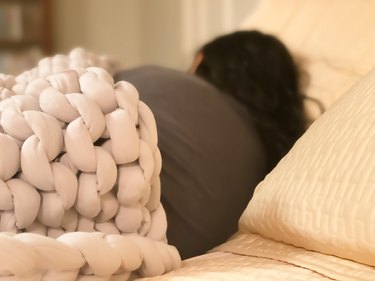
Weighted blankets are trendy because of their supposed ability to offer relief from conditions like insomnia and anxiety. But do weighted blankets work?
If you've never heard of weighted blankets, here's the deal: They're blankets infused with glass beads or plastic pellets to add heft and apply pressure across your body. They can range from 5 to 40 pounds, according to the Cleveland Clinic, and come in a variety of fabrics, styles and sizes.
Video of the Day
Video of the Day
The question of whether weighted blankets are good for you is a little trickier to answer. "[They] may be helpful for adults who struggle with insomnia, restlessness or anxiety," Meghan Marcum, PsyD, chief psychologist for AMFM Healthcare, tells LIVESTRONG.com. "It can help by providing a sense of comfort due to the pressure that comes with sleeping under this type of blanket."
Specific research on weighted blankets is lacking, but there is some evidence to show that the deep pressure they provide may help ease certain conditions. Here's how weighted blankets work in different contexts, plus whether or not you should try one.
How Heavy Should My Weighted Blanket Be?
"Heavier blankets can weigh up to 40 pounds and should be used with caution," Marcum says. "Weighted blankets can be dangerous for children or adults who may be extremely weak."
With that in mind, look for a blanket that's about 10 percent of your body weight, per the Cleveland Clinic. For instance, if you weigh 160 pounds, you should use a blanket that's around 15 pounds. The same goes for children, but make sure the blanket is meant for your child's age range and talk to your pediatrician before allowing your child to cuddle up with one.
1. They May Help Ease Anxiety
Perhaps you've heard of using weighted blankets for anxiety. And as it turns out, there's some science to back up this claim, according to the Cleveland Clinic.
For instance, a March/April 2020 review in the American Journal of Occupational Therapy concluded that weighted blankets can sometimes help reduce anxiety, though the researchers noted that more studies are needed to better understand why weighted blankets work and how to use them therapeutically.
Researchers also found an association between using a weighted blanket and decreased anxiety in a March 2021 study in the Journal of Integrative Medicine.
The study observed anxiety levels in 30 people who had been involuntarily committed to a mental health facility before and after the use of a weighted blanket, and found that those who used a weighted blanket for 20 minutes had reduced symptoms of anxiety (like a fast pulse) compared to those who did not.
This was a small study, though, so more research is needed to better establish this link.
2. They Might Help With Insomnia
Marcum says weighted blankets may be good for insomnia, though research-wise, the jury is still out.
One September 2020 study in the Journal of Clinical Sleep Medicine found that weighted blankets were a safe and effective option for treating insomnia in people with certain conditions like major depressive disorder, bipolar disorder, generalized anxiety disorder and ADHD.
However, the American Journal of Occupational Therapy review mentioned above also assessed whether weighted blankets can help with insomnia and found there's limited evidence to prove this effect.
What's more, researchers found that the use of a weighted blanket in children with autism did not help them fall asleep faster, stay asleep longer or wake fewer times during the night, per an August 2014 study in Pediatrics. However, because this study focused specifically on kids with autism, more research is needed to better understand the effects of weighted blankets on sleep for other populations.
Tip
Practicing good sleep hygiene and seeing a mental health professional to help ease anxiety may also help you get better shut-eye, per the Cleveland Clinic.
3. They May Help Calm Children With Autism
Weighted blankets have long been used as a therapeutic tool to help children with autism and other behavioral conditions because of their ability to provide deep pressure, according to Harvard Health Publishing. That's because the pressure simulates the experience of being hugged, held or squeezed, which can help calm the nervous system.
A small January 2017 study in Occupational Therapy International evaluated 13 people ages 7 to 18 with autism and other intellectual disabilities and found that deep pressure therapy via massaging, brushing and squeezing was linked to improvement in the following areas:
- Calmness
- Responsivity
- Happiness
- Engagement
- Communicativeness
But not everyone in the study benefited from this therapy to the same extent. And the researchers found tactile forms of deep pressure therapy (aka massages, not weighted garments or blankets) were the most effective. Finally, the study was small, so more and larger-scale research is needed to better establish a link between deep pressure therapy, its effects and who can benefit from it.
4. They Might Help Reduce ADHD Symptoms
ADHD is a chronic condition that affects both children and adults and leads to difficulty focusing, impulsive behavior and hyperactivity, per the Mayo Clinic. Few studies examine the use of weighted blankets for helping to treat ADHD.
But one March/April 2014 study in the American Journal of Occupational Therapy found that children who wore weighted vests fidgeted less, focused better and were able to stay in their seats longer than when they weren't wearing the vest.
However, this research doesn't address adults with ADHD, so more studies are needed to understand the link between this condition and weighted blankets or garments.
5. They May Help With Chronic Pain
Another potential benefit of weighted blankets is that they may help relieve chronic pain, according to an August 2021 study in the Journal of Pain.
In the study, 94 adults with chronic pain were given either a 15-pound or a 5-pound weighted blanket. Those who used the heavier blanket reported perceiving less pain. What's more, people with high levels of anxiety reported an even greater reduction in their pain.
Moral of the story: Weighted blankets are an accessible, at-home tool for possibly reducing chronic pain.
However, the researchers also noted that more studies are needed to understand the link between weighted blankets and chronic pain relief specifically, as most existing research focuses on acute pain.
What About Restless Legs Syndrome?
What else do weighted blankets do? Well, there are anecdotal claims that tout the use of weighted blankets for restless legs syndrome because of the deep pressure.
That said, there isn't enough scientific evidence to suggest that it's beneficial for people with the condition.
The Best Weighted Blankets to Buy
Marcum recommends looking for the following characteristics in a blanket:
- Made from sustainable and environmentally-friendly materials
- Weighs less than 40 pounds
- Provides a cooling effect
Based on those criteria, here are our picks for the best weighted blanket.
The Takeaway
There's anecdotal evidence to support the use of weighted blankets, especially when it comes to anxiety. At the very least, there's no harm in giving one a try so long as you pick the right weight for your body size and strength.
Just keep in mind that weighted blankets aren't a magic cure for anxiety, insomnia, chronic pain or other health conditions — talking to your doctor is your best bet when it comes to treating any of these conditions.
- Cleveland Clinic: "Do Weighted Blankets Work?"
- Occupational Therapy International: "The Immediate Effects of Deep Pressure on Young People with Autism and Severe Intellectual Difficulties:" Demonstrating Individual Differences
- Harvard Health Publishing: "Anxiety and stress weighing heavily at night? A new blanket might help"
- Journal of Integrative Medicine: "Using weighted blankets in an inpatient mental health hospital to decrease anxiety"
- Pediatrics: "Weighted Blankets and Sleep in Autistic Children—A Randomized Controlled Trial"
- American Journal of Occupational Therapy: "Effects of Weighted Vests on Attention, Impulse Control, and On-Task Behavior in Children With Attention Deficit Hyperactivity Disorder"
- Journal of Pain: "Widespread Pressure Delivered by a Weighted Blanket Reduces Chronic Pain": A Randomized Controlled Trial
- Journal of Clinical Sleep Medicine: "A randomized controlled study of weighted chain blankets for insomnia in psychiatric disorders"
- Mayo Clinic: "Attention-deficit/hyperactivity disorder (ADHD) in children"
- American Journal of Occupational Therapy: "Weighted Blanket Use: A Systematic Review"
Is this an emergency? If you are experiencing serious medical symptoms, please see the National Library of Medicine’s list of signs you need emergency medical attention or call 911.


